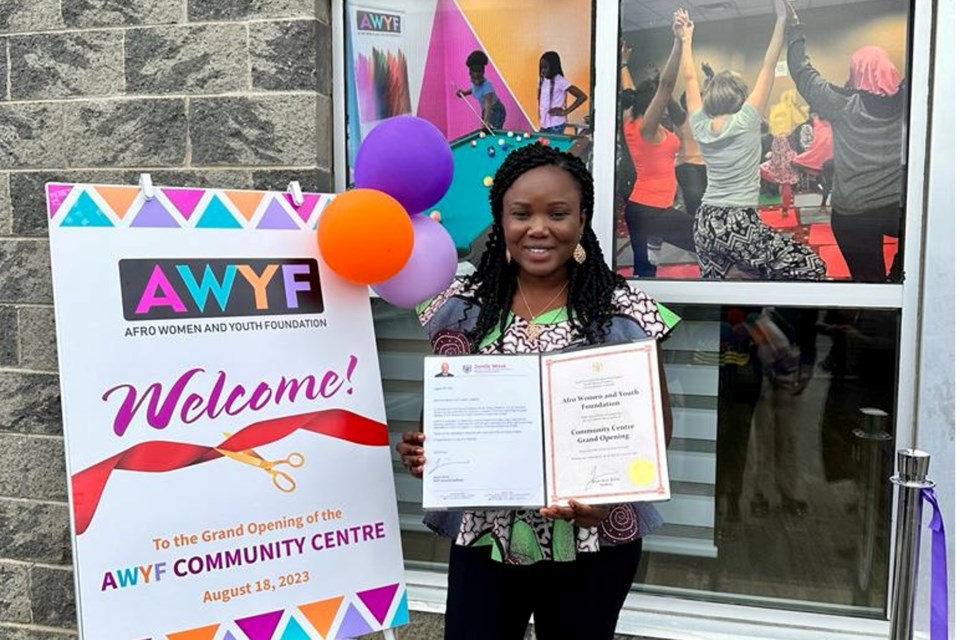The Afro Women and Youth Foundation of Sudbury has a new community centre to better serve their community. Founder and executive director Adebola Adefioye told Sudbury.com for many, it has become a haven, a safe space and home away from home.
Originally from Nigeria, Adefioye has taken what she has learned as a newcomer to this community and passed that knowledge to others facing the same struggles.
She founded the Afro Women And Youth Foundation after her daughter’s experience of racism as a newcomer to Canada. She was bullied for her race and her mother decided to teach her how to advocate for herself, something that is difficult for most women, but in particular, for women of colour and newcomers. She began teaching self-empowerment.
She said in practice, it's about acknowledging when you feel disrespected, identifying the intent behind it— whether it is malicious, or simply out of ignorance — and speaking up.
Self advocacy is the one key, she said, but also, learning how to do that comes from a feeling of safety in other areas of life. For that reason, she created the community space.
“A safe space for support where people can come together, interact and enhance social skills and wellness,” said Adefioye. “People need to feel comfortable before they can think about speaking up, especially when they wouldn't naturally speak up, so all our programs are built around empowering people to self advocate, because that's how things can get better.”
At the space are, of course, women and youth, but also international students and refugees to Canada.
“The people that we serve need to have a place to come in to get support, to use the services that we offer,” she said. She said she felt there was a gap in services, and wanted to offer one specifically to Black women and girls.
“You want to be where people will look like you, people who can maybe speak your language, people who maybe share the same identity as you in whatever form,” she said. “So as much as we have a lot of programs and services or support newcomers, we think that this one is very important. Sometimes we come together, and we're just expressing our emotions.”
That expression can also come through sewing, crafting, painting and even cooking. Adefioye said that not only are their cooking classes offered (using certified kitchens off-site), but the kitchen also becomes a place of sharing, and laughter.
“We are all in the kitchen, cooking together, and when we're done cooking, we share the meals we eat together, laugh together, share our stories,” she said. “Our strategy for wellness is just creating opportunities for women to come together and express themselves. And we don't just do it for them, we collaborate together to see what they need.”
But as much as the foundation is specifically for Black women and girls, Adefioye said she also wants to ensure that she encourages diversity.
“In Canada, we talk a lot about multiculturalism, but sometimes we’re also just coming together in our own little spaces,” she said. “So as much as we need culturally-appropriate support, we also want to be learning about other people's cultures and to be intentional about initiating those relationships, because we want to live together in this community.”
For this reason, there have been Indigenous-led programs like learning to bead in the local traditions.
“It's important to learn to see things through another lens,” she said. “I think that helps us to maintain unity in the community.”
The Afro Women and Youth Foundation’s hub, located at 1191 Lansing Ave. in New Sudbury, will also soon house a clothing bank, accepting clothing donations to give to newcomers, refugees and those vulnerable to the winter temperatures. Adefioye said the foundation accepts clothing and monetary donations, and they are also in need of volunteers.
“We have a volunteer signup sheet, and anyone can also walk into our office and learn about our programs and see how they can support. Anyone can reach out to us to learn more about our programs, and see where they can fit in,” she said.
The foundation could also benefit from sustainable funding, and grant writers or those who can navigate funding systems are welcome.
For Adefioye, it’s about sharing what she has learned to make her community better. “We talk together, we share experiences — people who have come here a year ago, six months ago, three months ago — I’m encouraged to know that they feel supported, they feel loved, and they can continue to also navigate whatever challenges that comes their way.”
You can find more information about the Afro Women and Youth Foundation on their website, found here.
Jenny Lamothe is a reporter with Sudbury.com Women & Girls is made possible by our Community Leaders Program.



